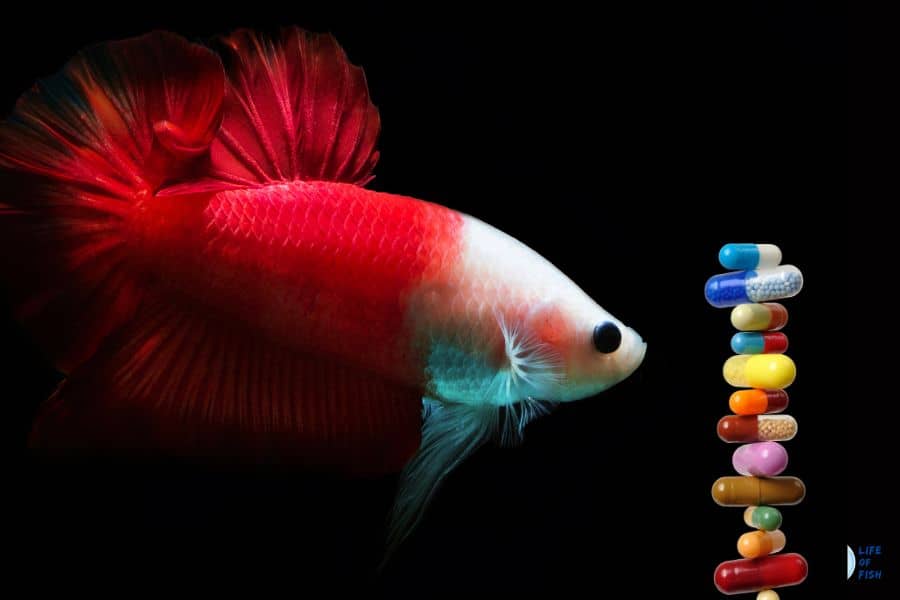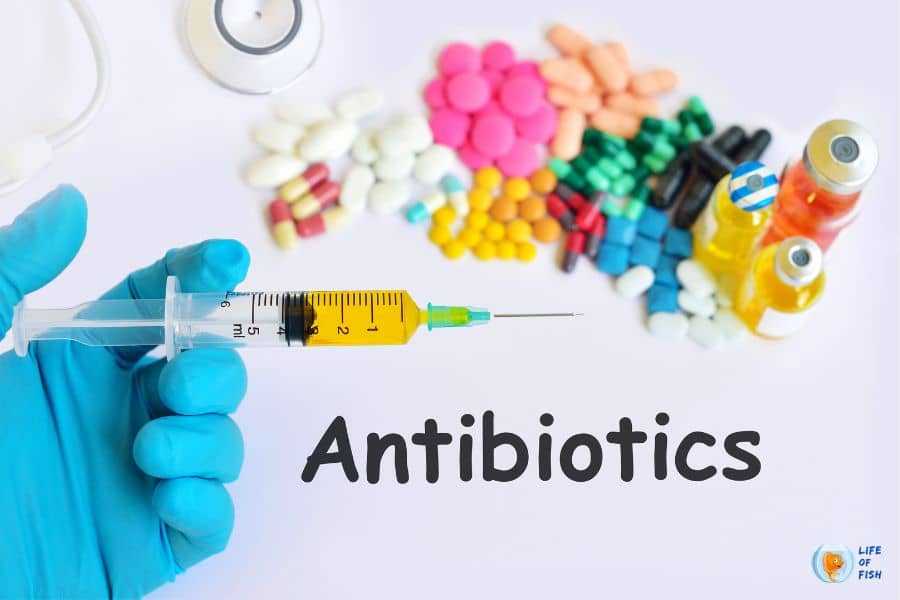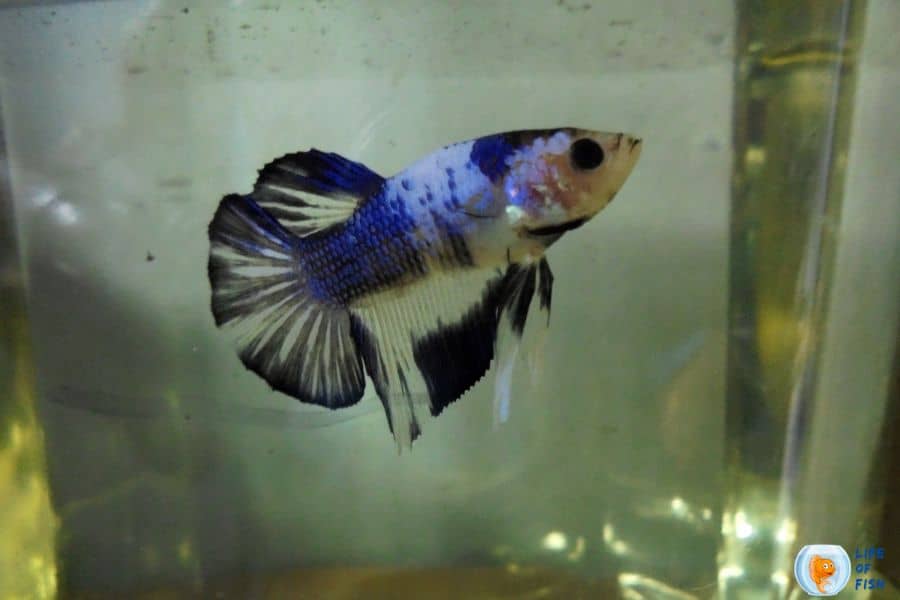Betta fish are hardy fish that can tolerate a wide range of water conditions and are also susceptible to various diseases. Among them, bacterial infections are the most common and can be fatal if not treated. Fortunately, you can treat bacterial infections with betta fish antibiotics. In this article, we’ll discuss fish antibiotics and how they work, the best antibiotics for bettas, how to administer them, and when to use them.

How Do You Treat A Bacterial Infection In A Betta?
Jump To
There are two main ways to treat bacterial infection: natural antibiotics and pharmaceutical antibiotics. The former is known to be safe, but the latter is the most effective.
Natural Antibiotics
Natural antibiotics are derived from plants and other organisms that have antibiotic properties. They are effective against a wide range of bacteria, including the ones that cause infections in bettas. The following are some of the most common natural antibiotics for bettas:
Ginger – Ginger is a common household spice that has anti-inflammatory and antibacterial properties. It is effective against a wide range of infections, including betta bacterial infections.
Garlic – Garlic is another common household spice that has antimicrobial properties. You can use them to treat bacterial, fungal, and viral infections.
Turmeric – Turmeric is a spice that has anti-inflammatory and antibacterial properties. You can use them to treat betta infections and other diseases.
Pharmaceutical Antibiotics
Pharmaceutical antibiotics are man-made drugs. And they are used to treat infections. They are more effective than natural antibiotics. Also, people use them to treat a wide range of infections, including betta bacterial infections. While you can use either type of antibiotic to treat a betta infection, we recommend using pharmaceutical antibiotics since they are more effective.
About Fish Antibiotics
Fish antibiotics work by killing or inhibiting the growth of bacteria. Usually, a healthy fish’s immune system is able to keep the bacteria in check, but sometimes the bacteria can get out of control and cause an infection. The most common type of infection in bettas is a bacterial infection. Bacteria are single-celled organisms that can live in water, soil, and on surfaces. They can cause a wide range of infections, including skin, ear, and respiratory infections.
Fish antibiotics are available in a variety of forms, including tablets, capsules, powders, and liquids. They are usually taken orally but can also be injected intramuscularly or intravenously.
The most common fish antibiotics are:
- Ampicillin – Ampicillin is a beta-lactam antibiotic. It treats a wide range of infections, including betta bacterial infections.
- Cephalexin – Cephalexin is a cephalosporin antibiotic. It treats a wide range of infections, including betta bacterial infections.
- Erythromycin – Erythromycin is a macrolide antibiotic. It treats a wide range of infections, including betta bacterial infections.
- Ciprofloxacin – Ciprofloxacin is a fluoroquinolone antibiotic. It treats a wide range of infections, including betta bacterial infections.
For more fish antibiotics, refer to this study.

How Do Antibiotics Work?
Antibiotics can work in two different ways. It can either kill the bacteria or inhibit their growth of the bacteria. Bacteria-killing antibiotics are bactericidal. While antibiotics that inhibit the growth of the bacteria are called bacteriostatic. A bactericidal antibiotic works by killing the bacteria, while a bacteriostatic antibiotic works by inhibiting the growth of the bacteria.
Bactericidal drugs are more effective than bacteriostatic antibiotics because they can kill bacteria. However, bacteriostatic antibiotics are less likely to cause side effects since they only inhibit the growth of the bacteria, which can be more effective on some bacterium types. Most antibiotics work by killing the bacteria, but there are a few that work by inhibiting the growth of the bacteria.
Depending on the infection type, you may need to take a different type of antibiotic. For example, if your fish has a gram-negative bacterial infection, you’ll need to take a bacteriostatic antibiotic such as erythromycin. However, the same antibiotic work as a bactericidal antibiotic in high concentrations of gram-positive bacteria. That is why erythromycin is also used to treat gram-positive bacterial infections in fish.
Things To Consider When Giving Fish Antibiotics
Antibiotics are not some regular medications you can give your fish without consideration. You must be very careful when giving antibiotics to your fish, as there are some things you must consider first.
The Dosage
The most important thing you need to consider is the dosage. The dosage of the antibiotic will depend on the type of infection your fish has. For example, the recommended dosage of ampicillin for a gram-negative bacterial infection is 10-20 mg/L, while the recommended dosage of erythromycin for a gram-negative bacterial infection is 5-10 mg/L.
However, the dosage of the antibiotic can also vary depending on the age and weight of your fish. For example, the recommended dosage of ampicillin for a 1-2gram fish is 5-10 mg/L, while the recommended dosage of ampicillin for a 3-4 gram fish is 10-20 mg/L.
The length of treatment
Another thing you need to consider is the length of the treatment. The length of the treatment will also depend on the type of infection your fish has. For example, the recommended length of treatment for a gram-negative bacterial infection is 5-10 days, while the recommended length of treatment for a gram-positive bacterial infection is 10-14 days.
However, the length of the treatment can also vary depending on the age and weight of your fish. For example, the recommended length of treatment for a 1-2gram fish is 3-5 days, while the recommended length of treatment for a 3-4 gram fish is 5-10 days.
The type of antibiotic
Another thing you should consider is the type of antibiotic you’re going to use. As we’ve mentioned before, there are two types of antibiotics: bactericidal and bacteriostatic. Bactericidal drugs are more effective than bacteriostatic antibiotics but are more likely to cause side effects. That is why you need to be very careful when choosing the type of antibiotic you’re going to use.
In general, it’s better to use a bactericidal antibiotic if the infection is severe, while it’s better to use a bacteriostatic antibiotic if the infection is not that severe.

The side effects
Antibiotics can cause some side effects on your betta, such as loss of appetite, lethargy, and increased susceptibility to infections. That is why you need to be very careful when giving antibiotics to your fish. You should always consult a veterinarian before giving antibiotics to your fish. A veterinarian will prescribe the right antibiotic for your fish and help you avoid any side effects.
Nitrifying Bacteria
When treating with antibiotics, one of the main concerns is the effect on the nitrifying bacteria in the fish tank. Nitrifying bacteria are responsible for the breakdown of ammonia in the fish tank. Ammonia is a toxic substance that can kill your fish, so it’s important to have nitrifying bacteria in the fish tank. However, nitrifying bacteria are very sensitive to antibiotics. That is why you need to be very careful when using antibiotics in a fish tank.
If possible, the best option is to move the sick fish into a quarantine tank before treating it with antibiotics. This will prevent the antibiotics from affecting the nitrifying bacteria in the fish tank. Another option is to use an antibiotic that is safe for nitrifying bacteria. Some examples of safe antibiotics are erythromycin and sulfa drugs.
Use of antibiotics in healthy betta fish
As we’ve mentioned before, antibiotics should only be used when your fish is sick. However, some aquarium owners use antibiotics as a preventative measure. There is no evidence that using antibiotics as a preventative measure is effective. In fact, using antibiotics when your fish is healthy can be harmful. When you use antibiotics on healthy fish, the bacteria in the tank may become resistant to the drug. This indicates that the antibiotic is no longer effective against the bacteria, which might lead to major complications if your fish becomes ill.
Using human antibiotics on fish
Antibiotics intended to use in fish are, in fact, antibiotics used in humans. However, the dosages can be very different. If finding fish antibiotics is not easy in your area, you can actually use human antibiotics. When utilizing human antibiotics on fish, however, extreme caution is required. Make sure to use the right dosage and consult a veterinarian before using human antibiotics on fish.

Betta Fish Antibiotics
Since betta fish are small fish, many betta fish owners think twice before using any medication on them. Most betta fish owners try to find medications especially made for betta fish in case of sickness. However, you can actually use any fish antibiotic on betta fish. Just make sure to use the right dosage and consult a veterinarian before using any medication on betta fish.
Some common betta fish antibiotics include,
- Kanaplex
- Amoxicillin
- Keflex
- Tetracycline
- Erythromycin
- Terramycin
- Furazolidone
- Sulfa
Most of these antibiotics are broad-spectrum antibiotics. That means that they can be used to treat a variety of different infections. Kanaplex and Amoxicillin are two of the most commonly used betta fish antibiotics.
How Do You Medicate A Sick Betta?
You can use a variety of different methods to medicate a sick betta.
Mix the medication into the water
The most common way to medicate a sick betta is to mix the medication into the water. This is the most straightforward and convenient approach. However, not all medications can be added to the water. Some medications need to be added to the food.
Mix the medication with food
If the medication cannot be added to the water, you can mix it with the food. To do this, you will need to crush the pill into a powder. Then, you can mix the powder with the food. However, this method is not always effective. Some betta fish will not eat their food if they can taste the medication.
Use bath treatment
Another way to medicate a sick betta is to use a bath treatment. To do this, remove the betta from the fish tank and place it in a cup or bowl of water. Then, you can add the medication to the water. After adding the medication, you will need to let the betta soak in the water for about 30 minutes. After 30 minutes, you can put the betta back in the fish tank.
Injection
The most effective way to medicate a sick betta is to use an injection. To do this, remove the betta from the fish tank and place it in a cup or bowl of water. Then, you will need to use a syringe to inject the medication into the betta. After injecting the medication, you can put the betta back in the fish tank. However, you will need a vet to show you how to do this properly.

Conclusion: betta fish antibiotics
Betta fish are small fish, so many betta fish owners think twice before using any medication on them. However, you can actually use any fish antibiotic on betta fish. When using antibiotics, it is important to use the right dosage. Too much or too little antibiotics can be harmful to your fish. It is always best to consult a veterinarian before using any medication on your fish.
Related question
How Do You Give A Betta Fish Tetracycline?
The usual tetracycline dosage for a fish tank is 3-4 grams per 100 liters. However, the fish antibiotics sold at the pet store may have different dosage recommendations. For example, Fish Cycline. comes in 250g packets which are enough for 15 gallons of water. API T.C. Tetracycline packet can be added to 10 gallons of water. So, it is always best to follow the dosage recommendations on the package. To give your betta fish Tetracycline, mix the medication into the water.
Can I Use Kanaplex For Betta Fish?
Yes, you can use Kanaplex for betta fish. Kanaplex is a broad-spectrum antibiotic that can be used to treat a variety of different infections. To give your betta fish Kanaplex, mix the medication into the water.
Is Bettafix An Antibiotic?
No, Bettafix is not an antibiotic. Bettafix is a natural remedy that can be used to treat a variety of different infections. However, it also has antibacterial properties. To give your betta fish Bettafix, mix the medication into the water.
Read Next : What Is Fish Antibiotics (And Best Fish Antibiotics)
